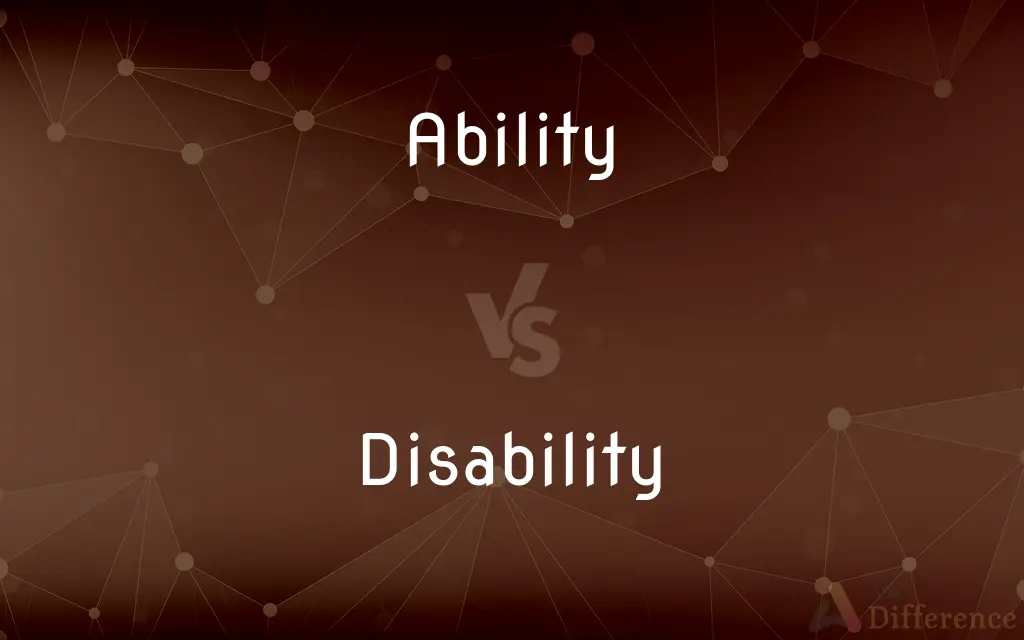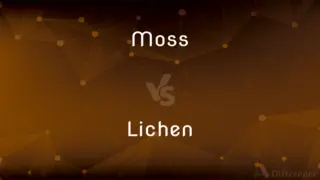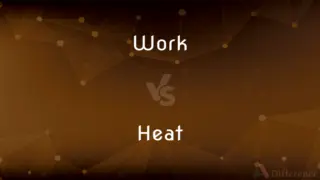Ability vs. Disability — What's the Difference?
Edited by Tayyaba Rehman — By Fiza Rafique — Updated on March 9, 2024
Ability refers to the competence or skill to perform a task, emphasizing potential and capability, while disability indicates a limitation or impairment in performing tasks that are considered standard for most people.

Difference Between Ability and Disability
Table of Contents
ADVERTISEMENT
Key Differences
Ability encompasses the skills, talents, or competencies that individuals possess, allowing them to perform specific tasks effectively. These can range from physical strength to intellectual prowess, and they play a significant role in how individuals navigate and succeed in various aspects of life. On the other hand, disability refers to physical or mental conditions that limit a person's movements, senses, or activities. Disabilities can impact individuals' daily lives and their ability to perform tasks that are typically taken for granted by those without such limitations.
While abilities often highlight what individuals can do, either through innate talent or learned skills, disabilities focus on the challenges or barriers individuals face due to various impairments. However, it's important to note that the presence of a disability does not negate the existence of abilities; many people with disabilities possess unique talents and competencies. Conversely, acknowledging the abilities in individuals without overlooking the challenges they may face due to disabilities is crucial for fostering an inclusive society.
Abilities can be developed and enhanced over time through education, practice, and experience. People invest in developing their abilities to improve their performance in various domains, such as academics, sports, or the arts. Disabilities, whereas, may require adaptation, support, and accommodations to enable individuals to participate fully in society. This could include assistive technologies, tailored learning methods, or environmental modifications.
The concept of ability is often used in a positive light, celebrating the potential and achievements of individuals. In contrast, the term disability has historically been viewed through a deficit lens, focusing on what individuals cannot do. However, contemporary perspectives emphasize the importance of recognizing the capabilities and contributions of people with disabilities, challenging societal barriers that hinder full participation.
Both ability and disability are integral to understanding human diversity. Recognizing and valuing the wide range of abilities within individuals, including those with disabilities, is key to creating more inclusive and supportive environments. This approach encourages looking beyond limitations to celebrate the unique contributions everyone can make to society.
ADVERTISEMENT
Comparison Chart
Definition
The competence or skill to perform a task.
A limitation or impairment in performing tasks that are standard for most people.
Focus
Highlights what individuals can do.
Focuses on challenges or barriers individuals face.
Development
Can be developed and enhanced over time.
May require adaptation, support, and accommodations.
Societal View
Often viewed positively, celebrating potential and achievements.
Historically viewed through a deficit lens, but perspectives are shifting.
Contribution to Diversity
Emphasizes human potential and capabilities.
Highlights the importance of recognizing and accommodating differences.
Compare with Definitions
Ability
Creative ability pertains to original thinking.
Her ability to create unique designs sets her apart in fashion.
Disability
Physical disability affects bodily functions.
His wheelchair use is due to a physical disability.
Ability
Social ability includes interpersonal skills.
Her ability to communicate effectively improves team performance.
Disability
Mobility disability restricts movement.
Accessible building features enable her to navigate despite her mobility disability.
Ability
Ability refers to physical strength.
Her ability to lift heavy weights made her an excellent firefighter.
Disability
Intellectual disability impacts cognitive function.
She receives support for her intellectual disability in school.
Ability
Technical ability covers specific skills.
His coding ability landed him a job at a top tech company.
Disability
Learning disability affects processing information.
Specialized teaching methods help her overcome her learning disability.
Ability
Cognitive ability involves mental capabilities.
His problem-solving ability is exceptional.
Disability
Sensory disability involves impairments in senses.
His guide dog assists with his visual disability.
Ability
Possession of the means or skill to do something
The manager had lost his ability to motivate the players
Disability
A program that provides financial support to people with such conditions
Has been on disability for a month.
Ability
Talent, skill, or proficiency in a particular area
Pupils of all abilities
A man of exceptional ability
Disability
A disability is any medical condition that makes it more difficult for a person to do certain activities or effectively interact with the world around them (socially or materially). These conditions, or impairments, may be cognitive, developmental, intellectual, mental, physical, sensory, or a combination of multiple factors.
Ability
The quality of being able to do something, especially the physical, mental, financial, or legal power to accomplish something.
Disability
A physical or mental condition that significantly limits a person's motor, sensory, or cognitive abilities.
Ability
A skill, talent, or capacity
A student of many abilities.
Disability
The state of having such a condition
Discrimination based on disability.
Ability
The quality of being suitable for or receptive to a specified treatment
The ability of a computer to be configured for use as a file server. See Usage Note at able.
Disability
The economic assistance provided by such a program
Has been getting disability since the accident.
Ability
(obsolete) Suitableness.
Disability
(Law) Lack of legal capacity to perform some act, such as to enter into a contract, because of infancy or lack of soundness of mind.
Ability
(uncountable) The quality or state of being able; capacity to do or of doing something; having the necessary power.
This phone has the ability to have its software upgraded wirelessly.
This wood has the ability to fight off insects, fungus, and mold for a considerable time.
Disability
State of being disabled; deprivation or want of ability; absence of competent physical, intellectual, or moral power, means, fitness, and the like.
Ability
The legal wherewithal to act.
Disability
A mental condition causing a difficulty with an intellectual task.
Dyscalculia is math disability.
Ability
Physical power.
Disability
(disability theory) An inability imposed on a person by society's failure to accommodate their physical or mental differences from others, as opposed to impairment.
Ability
(archaic) Financial ability.
Disability
Want of legal qualification to do a thing; legal incapacity or incompetency.
Ability
(uncountable) A unique power of the mind; a faculty.
Disability
Regular payments received by a disabled person, usually from the state
I had to go on disability after the accident.
Did you get your disability this month?
Ability
(countable) A skill or competence in doing; mental power; talent; aptitude.
They are persons of ability, who will go far in life.
She has an uncanny ability to defuse conflict.
A mixed-ability class
Disability
State of being disabled; deprivation or want of ability; absence of competent physical, intellectual, or moral power, means, fitness, and the like.
Grossest faults, or disabilities to perform what was covenanted.
Chatham refused to see him, pleading his disability.
Ability
The quality or state of being able; power to perform, whether physical, moral, intellectual, conventional, or legal; capacity; skill or competence in doing; sufficiency of strength, skill, resources, etc.; - in the plural, faculty, talent.
Then the disciples, every man according to his ability, determined to send relief unto the brethren.
Natural abilities are like natural plants, that need pruning by study.
The public men of England, with much of a peculiar kind of ability.
Disability
Want of legal qualification to do a thing; legal incapacity or incompetency.
The disabilities of idiocy, infancy, and coverture.
Ability
The quality of being able to perform; a quality that permits or facilitates achievement or accomplishment
Disability
The condition of being unable to perform as a consequence of physical or mental unfitness;
Reading disability
Hearing impairment
Ability
Possession of the qualities (especially mental qualities) required to do something or get something done;
Danger heightened his powers of discrimination
Common Curiosities
What is considered a disability?
A disability is any condition of the body or mind (impairment) that makes it more difficult for the person with the condition to do certain activities (activity limitation) and interact with the world around them (participation restrictions).
How does society benefit from recognizing diverse abilities?
Recognizing diverse abilities fosters inclusivity, innovation, and a broader understanding of human potential.
Can someone with a disability have remarkable abilities?
Yes, individuals with disabilities can possess unique talents and remarkable abilities in various fields.
How can abilities be enhanced?
Abilities can be enhanced through education, practice, and targeted training.
What accommodations are commonly made for people with disabilities?
Common accommodations include assistive technologies, environmental modifications, and customized learning strategies.
Can disabilities be acquired or are they always congenital?
Disabilities can be congenital (present from birth) or acquired due to injury, illness, or aging.
Are all disabilities visible?
No, many disabilities, such as mental health conditions or learning disabilities, are not visible.
How do disabilities impact daily life?
Disabilities can impact daily life by creating challenges in mobility, communication, learning, and performing daily tasks.
How can workplaces be more inclusive for people with disabilities?
Workplaces can be more inclusive by providing reasonable accommodations, fostering an accessible environment, and promoting diversity training.
Why is it important to focus on abilities in people with disabilities?
Focusing on abilities highlights the potential and contributions of individuals with disabilities, promoting a more inclusive perspective.
What role does technology play in supporting people with disabilities?
Technology plays a crucial role in supporting people with disabilities through assistive devices, software, and accessibility features.
What impact does stigma have on people with disabilities?
Stigma can lead to discrimination, social isolation, and barriers to accessing services for people with disabilities.
How do educational systems support students with disabilities?
Educational systems support students with disabilities through Individualized Education Programs (IEPs), accommodations, and specialized services.
What is the social model of disability?
The social model of disability suggests that disability is caused by the way society is organized, rather than by a person's impairment or difference.
How do laws protect the rights of people with disabilities?
Laws protect the rights of people with disabilities by ensuring access to employment, education, public services, and accommodations, such as the Americans with Disabilities Act (ADA) in the United States.
Share Your Discovery

Previous Comparison
Moss vs. Lichen
Next Comparison
Work vs. HeatAuthor Spotlight
Written by
Fiza RafiqueFiza Rafique is a skilled content writer at AskDifference.com, where she meticulously refines and enhances written pieces. Drawing from her vast editorial expertise, Fiza ensures clarity, accuracy, and precision in every article. Passionate about language, she continually seeks to elevate the quality of content for readers worldwide.
Edited by
Tayyaba RehmanTayyaba Rehman is a distinguished writer, currently serving as a primary contributor to askdifference.com. As a researcher in semantics and etymology, Tayyaba's passion for the complexity of languages and their distinctions has found a perfect home on the platform. Tayyaba delves into the intricacies of language, distinguishing between commonly confused words and phrases, thereby providing clarity for readers worldwide.














































